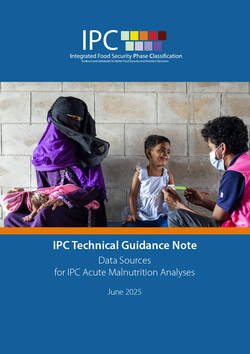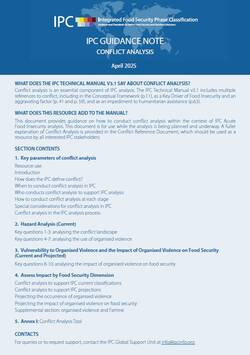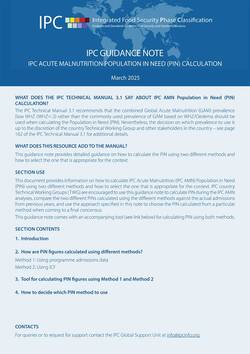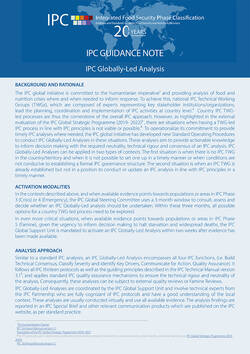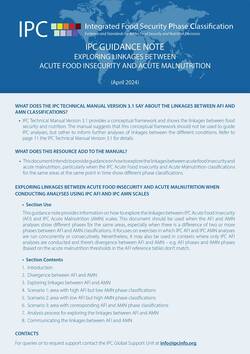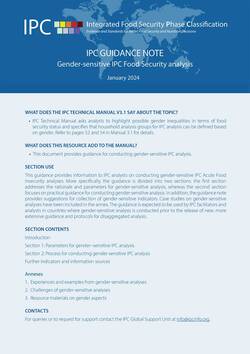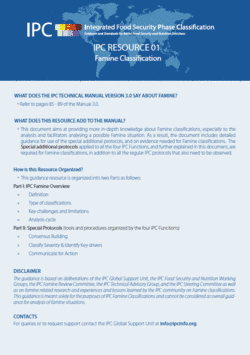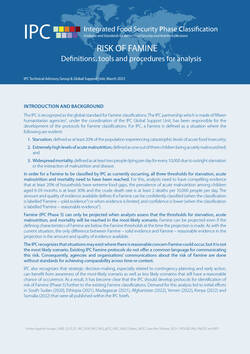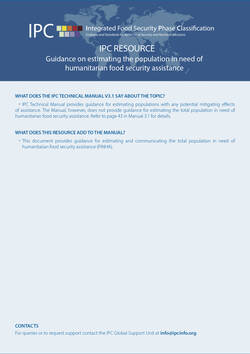IPC Guidance Notes
IPC Analysis Workshops in Practice
This guidance note explains the details of how IPC analysis workshops are run in practice. The IPC aims to inform decision-making in an agile, effective, and timely manner. IPC analysis workshops should be light and flexible, enabling rapid deployment in response to sudden shocks or evolving crises, while maintaining a balance between efficiency, quality, and inclusiveness—core principles of the IPC approach.
Data Sources for IPC Acute Malnutrition Analyses
The Data Sources for IPC Acute Malnutrition Analyses serves as a practical guide to help IPC analysts identify the most suitable and reliable data for classifying Global Acute Malnutrition (GAM) in IPC analyses. It outlines a step-by-step process for assessing the quality, timeliness, and compatibility of available GAM data—such as from SMART surveys, nutrition surveillance systems, and MUAC screenings—against IPC protocols. By systematically evaluating each source through this decision tree, [...]
Conflict Analysis to Support IPC Analysis and Conflict Analysis Reference Document
The Conflict Analysis to Support IPC Analysis guidance note provides guidance on how to conduct conflict analysis within the context of IPC Acute Food Insecurity analysis. This document for use while analysis is planned or underway. This Guidance Note serves two main groups: IPC practitioners at all levels of certification and conflict analysts. The expectations for using this guidance are based on an individual’s functional role in an analysis. The [...]
IPC Acute Malnutrition Population in Need (PIN) Calculation
This guidance note provides information on how to calculate IPC Acute Malnutrition (IPC AMN) Population in Need (PIN) using two different methods and how to select the one that is appropriate for the context. IPC country Technical Working Groups (TWG) are encouraged to use this guidance note to calculate PIN during the IPC AMN analyses, compare the two different PINs calculated using the different methods against the actual admissions from [...]
IPC Globally-Led Analysis
To operationalize its commitment to the humanitarian imperative — to provide timely analyses where needed — the Integrated Food Security Phase Classification (IPC) global initiative has developed new Standard Operating Procedures to conduct IPC Globally-Led Analyses in situations when having an IPC process in line with IPC principles led by a country IPC Technical Working Group is not viable or possible.
Exploring linkages between Acute Food Insecurity and Acute Malnutrition
This guidance note provides information on how to explore the linkages between IPC Acute Food Insecurity (AFI) and IPC Acute Malnutrition (AMN) scales. This document should be used when the AFI and AMN analyses show different phases for the same areas, especially when there is a difference of two or more phases between AFI and AMN classifications. It focuses on exercises in which IPC AFI and IPC AMN analyses are [...]
Gender-sensitive IPC Food Security analysis
This guidance provides information to IPC analysts on conducting gender-sensitive IPC Acute Food Insecurity analyses. More specifically, the guidance is divided into two sections: the first section addresses the rationale and parameters for gender-sensitive analysis, whereas the second section focuses on practical guidance for conducting gender-sensitive analysis. In addition, the guidance note provides suggestions for collection of gender-sensitive indicators. Case studies on gender-sensitive analyses have been included in the annex. [...]
Famine Classification
This document aims at providing more in-depth knowledge about Famine classifications, especially to the analysts and facilitators analysing a possible Famine situation. As a result, the document includes detailed guidance for use of the special additional protocols, and on evidence needed for Famine classifications. The Special additional protocols applied to all the four IPC Functions, and further explained in this document, are required for Famine classifications, in addition to all the regular [...]
Risk of Famine
The IPC partnership defines ‘risk of Famine’ as the reasonable probability of an area going into Famine (IPC Phase 5) in the projected period, when Famine is not the most likely scenario. When analysts assess that the most likely scenario would result in Famine, either Famine – solid evidence or Famine – reasonable evidence will be classified (depending on the amount and quality of evidence available). By contrast, analysts may [...]
Estimating the population in need of humanitarian food security assistance
Under existing IPC AFI protocols, populations are classified into five different IPC Phases, given the full set of conditions and outcomes those households are understood to be facing. Given that some households may be relying on humanitarian food security assistance in the current situation to meet their basic food needs, those households might have better outcomes (and therefore be classified in a better IPC Phase) than if they had not [...]
Join our mailing list


